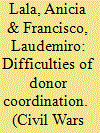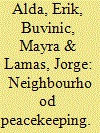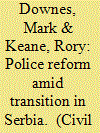|
|
|
Sort Order |
|
|
|
Items / Page
|
|
|
|
|
|
|
| Srl | Item |
| 1 |
ID:
075025


|
|
|
|
|
| Publication |
2006.
|
| Summary/Abstract |
Private companies play an increasingly important role in security sector reform (SSR). Bilateral donors and multilateral organisations are making use of the services of contractors to conceptualise and implement reforms to institutions that provide public security. The rapid increase in the outsourcing of SSR and the belief that the private sector's role in SSR will continue to expand in the future calls for a dispassionate analysis and debate on the role of the contractors and the benefits and risks outsourcing entails. This article investigates the role of one particular subset of contractors involved in SSR - management consultants - taking as a case study the work of Atos Consulting, subcontracted by the UK Department for International Development, in reforming the Jamaican police.
|
|
|
|
|
|
|
|
|
|
|
|
|
|
|
|
| 2 |
ID:
075021


|
|
|
|
|
| Publication |
2006.
|
| Summary/Abstract |
This article is explores UNDP's SSR activities in Mozambique, from the last stages of the post-civil war DDR programme until the beginning of 2005. It focuses primarily on the police force while looking at similar efforts in the judicial sector. It also focuses on how UNDP's strategic planning capacity and programme approaches affected the outcome of reforms sought. Finally, it analyses the constraints of Mozambique's SSR that affected its progress and implementation, including the rationale for embarking on reform and the persistent resistance to change by national institutions.
|
|
|
|
|
|
|
|
|
|
|
|
|
|
|
|
| 3 |
ID:
075019


|
|
|
|
|
| Publication |
2006.
|
| Summary/Abstract |
This article analyses the preparations and implementation of US-led Security Sector Reform in Iraq between March 2003 and January 2005. The Iraq experience shows that detailed planning is necessary to avoid a post-conflict security gap, including a realistic notion of foreign security force numbers and of the time they will need to take a lead in providing security. Rampant insecurity following the fall of Baghdad and the lack of US SSR plans led to ad-hoc attempts to stand up, transform and reform Iraq's security services. The US lacked a central hub to coordinate its efforts in the first 18 months. Scrambling to push Iraqis to the front lines of security, the US emphasized numbers over quality, outsourced training to neighboring countries and private companies, created an auxiliary force (the ICDC) beholden only to the US military unit that trained and commanded it, and, later, specialized units in the police and the army dedicated to fighting insurgents. They were ultimately ineffective, unable to demobilize Iraq's growing militias, and later became beholden to sectarian influences under Iraq's sovereign governments. The chief shortcoming in the initial stages lay in neglecting the urgent need to build security institutions at same time as training recruits, that is, standardized training and a clear command structure, personnel and management policies, political responsibility, and oversight (by ministerial inspectors, the judiciary and popular representative bodies).
|
|
|
|
|
|
|
|
|
|
|
|
|
|
|
|
| 4 |
ID:
075020


|
|
|
|
|
| Publication |
2006.
|
| Summary/Abstract |
The UN's once-vaunted peace operation in Timor-Leste achieved many successes, overcoming a major humanitarian crisis and laying basic foundations for the future state's governance institutions. However, in the critical areas of police and military reform, the UN failed to exploit its unparalleled civil authority and relatively benign operating environment. Poor leadership, negligible planning and altogether unqualified UN police contingents produced security services devoid of adequate institutional development and woefully lacking in any democratic oversight. Largely as a result of the UN's failings in this regard, the unrest that erupted in May 2006 witnessed the total collapse of the Timorese police force."
|
|
|
|
|
|
|
|
|
|
|
|
|
|
|
|
| 5 |
ID:
075023


|
|
|
|
|
| Publication |
2006.
|
| Summary/Abstract |
The Inter-American Development Bank (IDB) incorporated, nearly a decade ago, violence prevention in its lending portfolio. Since the first citizen security project loan was approved, the IDB has accumulated valuable experience on the design and implementation of violence prevention operations, placing the Bank at the forefront of this type of lending in the region. To date, the IDB has financed more than US$150 million for six citizen security loans, technical cooperation projects, and international seminars and meetings. In addition, several other citizen security projects are in advanced stages of design. This report overviews the Bank's work in this area, analysing, based on available data from completed projects, what works and the challenges that remain in reducing and preventing crime and violence. For example, Colombia (Bogotá) and Uruguay have completed their operations with success in the areas of community policing, institutional strengthening, community mediation units, domestic and youth violence prevention, and social awareness campaigns. This report also presents recommendations to maximise benefits and increase the effectiveness of the interventions in future project loans. Despite the accomplishments in this area, it is important to emphasise that crime and violence prevention is not a 'one shot deal' but a process that ought to be sustained over time and governments in the region must fully commit to combat it.
|
|
|
|
|
|
|
|
|
|
|
|
|
|
|
|
| 6 |
ID:
075022


|
|
|
|
|
| Publication |
2006.
|
| Summary/Abstract |
Overcoming the legacy of the past is never easy. Add in a brewing ethnic conflict in the south, and the task of supporting the institutional transition from a politicised and autocratic police force into a viable and democratic police service and you begin to understand the daunting task facing the Serbian government and its partner, the Organization for Security and Cooperation in Europe (OSCE) in the months following the overthrow of the Milosevic regime in October 2000.
The OSCE's role as an independent broker was essential in negotiating a path between a demoralised and outdated police force and a sceptical, untrusting public. Now some six years since the start of the police reform process, it is safe to say that the police service in Serbia today is distinctly different from the one that was inherited from the Milosevic government. Much, however, remains to be done for it to be a truly modern, representative and democratic service. This paper provides an 'inside' take on the OSCE's engagement with the Serbian police reform process, its institutional strengths and limitations. Through the lens of the years 2000-2004, this paper will critique the ability of the OSCE to support police and security reform processes. As such the article will assess how the OSCE and the Serbian authorities responded to the challenges facing the policing sector in the post-Milosevic Serbia.
|
|
|
|
|
|
|
|
|
|
|
|
|
|
|
|
| 7 |
ID:
075017


|
|
|
|
|
| Publication |
2006.
|
| Summary/Abstract |
Australia is engaged in a range of police-building exercises with its regional neighbours. The character of this assistance has changed across time and space reflecting, among other things, the development of new approaches to police-building in weak and post-conflict states. This article examines three such approaches adopted in Papua New Guinea and Solomon Islands, respectively. Both countries comprise challenging development contexts marked by high levels of social diversity and topographical fragmentation, weak centralised states, resilient and largely self-regulating village-based societies, and police forces with limited reach, resources, and popular legitimacy. Among other things, the review of Australian police-building experience in the Pacific Islands indicates the need to engage more effectively with non-state actors and organizations in building appropriate and sustainable policing systems in such fragile national environments.
|
|
|
|
|
|
|
|
|
|
|
|
|
|
|
|
| 8 |
ID:
075024


|
|
|
| 9 |
ID:
075018


|
|
|
|
|
| Publication |
2006.
|
| Summary/Abstract |
The UK's work in reforming security institutions in Sierra Leone is widely held as representing an example of successful SSR. Basic capacity and public trust has been restored in politicized and debilitated police and military institutions. It provided much needed confidence to people who no longer had faith in their own security institutions, and it created the stable, secure environment in which SSR could take place. This article offers the personal impressions and reflections of individuals actively involved in police and military reform. Three themes and policy dilemmas emerge from Sierra Leone's experience: the disconnection between policy and practice in the process; the difficulty of managing a process of comprehensive reform; and the question of sustainablity.
|
|
|
|
|
|
|
|
|
|
|
|
|
|
|
|
|
|
|
|
|